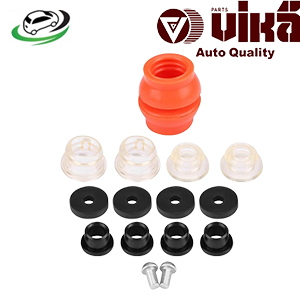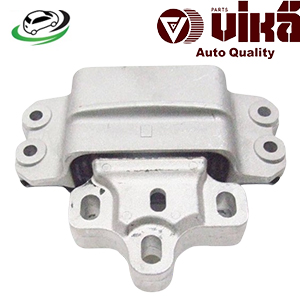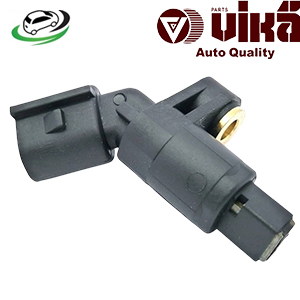-22%
Get AUDI TT MKI 180HP/225HP / VW 337/20AE/ Cabrio III/ Golf III/ Golf IV/ Jetta III/ Jetta IV/ Jetta IV GLI/ Passat B4/ R32 MKIV Right Front ABS Sensor 1J0927804
The Anti-lock Braking System (ABS) is one of the most critical safety features in modern vehicles. It prevents the wheels from locking up during sudden braking, ensuring that the driver maintains control of the vehicle, particularly on slippery surfaces. The ABS sensor, also known as the wheel speed sensor, plays a key role in this system by continuously monitoring the speed of each wheel and sending data to the ABS control unit.
In this guide, we’ll take a deep dive into the right front ABS sensor, exploring how it works, its functions, the importance of regular maintenance, signs of failure, and replacement procedures. This comprehensive 1000-word explanation will provide a thorough understanding of this essential automotive component.
1. What is an ABS Sensor?
An ABS sensor, also referred to as a wheel speed sensor, is a small but highly important component of the ABS system. It is installed at each wheel and monitors the rotational speed of the wheel. The sensor sends this data to the ABS control module, which uses it to determine if a wheel is about to lock up during braking.
In the case of the right front ABS sensor, it specifically monitors the speed of the vehicle’s right front wheel. If the sensor detects a sudden decrease in wheel speed during braking, indicating that the wheel is about to lock up, it signals the ABS system to modulate the braking pressure. This process prevents the wheel from locking, allowing the driver to maintain control of the vehicle.
2. How Does the Right Front ABS Sensor Work?
The right front ABS sensor operates on the principle of electromagnetic induction. It typically consists of two main components: the sensor itself and a toothed tone ring (reluctor ring) attached to the wheel hub or axle.
a. Sensor and Tone Ring Interaction
- The tone ring has evenly spaced teeth that rotate with the wheel. The ABS sensor is positioned very close to this ring.
- As the wheel rotates, the teeth pass by the sensor. This causes a change in the magnetic field, which induces an electrical signal in the sensor.
- The frequency of this signal corresponds to the rotational speed of the wheel.
b. Signal Transmission to ABS Control Unit
- The ABS sensor transmits this signal to the ABS control unit, which interprets the wheel speed data.
- When the control unit detects that one wheel (such as the right front wheel) is rotating slower than the others during braking, it takes action to prevent that wheel from locking up. This is done by modulating the brake pressure applied to that wheel, allowing it to continue rotating while still providing effective braking force.
3. Importance of the Right Front ABS Sensor
The right front ABS sensor is integral to maintaining vehicle stability and control during braking. Here’s why this component is so important:
a. Preventing Wheel Lock-Up
Without a functioning ABS sensor, the ABS system cannot detect wheel lock-up. This can result in the wheel skidding or sliding, especially during sudden or hard braking. A locked-up wheel significantly reduces the driver’s ability to steer, making the vehicle more prone to accidents.
b. Improved Braking Performance
By preventing the wheels from locking up, the ABS sensor helps maintain traction with the road surface. This improves overall braking performance, allowing the vehicle to stop more quickly and safely, even in emergency situations.
c. Enhanced Vehicle Control
A properly functioning ABS system, supported by accurate data from the ABS sensors, ensures that the driver maintains control of the vehicle during braking. This is particularly important in wet, icy, or slippery conditions where wheel lock-up is more likely to occur.
d. Compliance with Modern Safety Standards
Most vehicles today are required to have ABS as a standard safety feature. A faulty ABS sensor not only compromises safety but can also cause the vehicle to fail safety inspections in regions where ABS functionality is mandatory.
4. Signs of a Failing Right Front ABS Sensor
The right front ABS sensor is subject to wear and tear over time, and like any other vehicle component, it can fail. Common signs of a failing or faulty ABS sensor include:
a. ABS Warning Light
The most obvious sign of a failing ABS sensor is the illumination of the ABS warning light on the dashboard. When the sensor fails, the ABS control module cannot receive accurate data from the wheel, triggering the warning light.
b. Reduced Braking Performance
If the ABS sensor fails, the ABS system will not function properly, which can result in reduced braking performance. The driver may notice that the brakes lock up during sudden braking, particularly in slippery conditions.
c. Intermittent ABS Functionality
A failing ABS sensor can cause the ABS system to work intermittently. The ABS may engage unexpectedly, even under normal braking conditions, or it may fail to engage when needed.
d. Inconsistent Wheel Speed Readings
In some cases, the ABS control module may detect inconsistent wheel speed readings due to a faulty sensor. This can cause the ABS to activate even when the wheel is not in danger of locking up, leading to unnecessary brake pulsation.
5. Causes of ABS Sensor Failure
Several factors can contribute to the failure of the right front ABS sensor. These include:
a. Exposure to Road Debris
The ABS sensor is located near the wheel hub, making it vulnerable to damage from road debris such as rocks, dirt, and grime. Over time, this debris can accumulate on the sensor or the tone ring, causing it to malfunction.
b. Corrosion
Corrosion is another common cause of ABS sensor failure. The sensor and tone ring are often exposed to moisture, especially in regions with harsh winter conditions where road salt is used. This can cause rust to form on the tone ring or sensor, impairing its ability to function.
c. Wiring Issues
The ABS sensor is connected to the ABS control module by a wiring harness. Damage to this wiring, whether due to wear, corrosion, or accidental impact, can prevent the sensor from transmitting signals to the control module.
d. Physical Damage
Since the ABS sensor is located near the wheel, it is susceptible to physical damage from impacts or accidents. Damage to the sensor itself or the tone ring can lead to sensor failure.
6. Maintenance Tips for ABS Sensors
Regular maintenance of the ABS sensors is essential to ensure the proper functioning of the ABS system. Here are some tips to keep the right front ABS sensor in optimal condition:
a. Clean the Sensor and Tone Ring Regularly
Dirt and debris can accumulate on the sensor and tone ring, causing inaccurate readings. Regularly cleaning these components can help prevent issues. Use a soft brush and a non-abrasive cleaner to gently remove debris from the sensor.
b. Inspect for Physical Damage
During routine maintenance, inspect the ABS sensor for any signs of physical damage. Check the wiring harness for fraying, cuts, or corrosion, and ensure that the sensor is securely mounted in its position.
c. Check for Corrosion
In areas with high humidity or exposure to road salt, it’s important to inspect the ABS sensor for signs of rust or corrosion. Addressing corrosion early can prevent sensor failure.
d. Monitor ABS Warning Light
If the ABS warning light appears on the dashboard, have the ABS system diagnosed as soon as possible. Ignoring this warning can lead to compromised braking performance and reduced vehicle safety.
7. Replacing a Right Front ABS Sensor
When a right front ABS sensor fails, it needs to be replaced to restore the functionality of the ABS system. Here’s an overview of the replacement process:
a. Tools Required
- Jack and jack stands
- Socket set
- Torque wrench
- Replacement ABS sensor
b. Step-by-Step Replacement
- Lift the Vehicle: Use a jack to lift the front of the vehicle and secure it with jack stands.
- Locate the ABS Sensor: The right front ABS sensor is located near the wheel hub. You may need to remove the wheel to access it.
- Disconnect the Sensor: Unplug the wiring harness that connects the ABS sensor to the control module.
- Remove the Old Sensor: Use a socket set to remove the bolts securing the sensor to the wheel hub, then carefully remove the sensor.
- Install the New Sensor: Install the new ABS sensor in the same position and secure it with the bolts.
- Reconnect the Wiring: Plug the wiring harness into the new sensor.
- Test the ABS System: After installation, test the ABS system by driving the vehicle and checking for any warning lights.
Conclusion
The right front ABS sensor is a vital component that ensures the safe and effective operation of the ABS system. By continuously monitoring the wheel speed, the ABS sensor helps prevent wheel lock-up, enhancing vehicle control and braking performance. Regular maintenance and timely replacement of faulty ABS sensors are essential for ensuring optimal vehicle safety and performance, especially during emergency braking situations.
Follow us on Facebook for more parts.




Reviews
Clear filtersThere are no reviews yet.